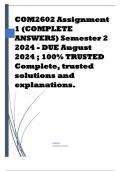COM2602 Assignment
1 (COMPLETE
ANSWERS) Semester 2
2024 - DUE August
2024 ; 100% TRUSTED
Complete, trusted
solutions and
explanations.
ADMIN
[COMPANY NAME]
,QUESTION 1 COMMUNICATION IN THE ORGANISATION
1.1 There is a debate between communicators in the field of
organisational communication regarding the role of
communication. Some commentators view communication as a
tactical activity in the organisation, manifested in such practices as
public relations or advertising. On the other hand, other
communicators argue that, in fact, communication has a strategic
role in the organisation. Taking this scenario into consideration:
1.1.1 Discuss the concept of strategy and its extensions. (15) 1.1.2
Explain whether communication has a strategic role or not. (10)
[25] 16
To address this assignment, we need to explore the concept of
strategy, its extensions, and the role of communication within an
organization. Here's a structured approach to answering the
questions:
1.1.1 Discuss the Concept of Strategy and Its Extensions. (15)
Concept of Strategy:
• Definition: Strategy is a plan of action designed to achieve
long-term or overall goals and objectives. It involves the
allocation of resources to pursue these objectives.
• Importance: Strategy provides direction, promotes
efficiency, and helps organizations navigate through
uncertainties and changes in the environment.
• Elements: Key elements include mission, vision, goals,
objectives, and the tactics used to achieve them.
Extensions of Strategy:
1. Corporate Strategy:
, o Focuses on the overall scope and direction of an
organization.
o Involves decisions on entering new markets, mergers
and acquisitions, and resource allocation across
business units.
o Example: A company deciding to diversify its product
line.
2. Business Strategy:
o Concerns how a business competes within a particular
market.
o Involves positioning, competitive advantage, and
differentiation.
o Example: A retail chain developing a unique brand
identity to stand out from competitors.
3. Functional Strategy:
o Focuses on specific functions within an organization,
such as marketing, finance, or operations.
o Aims to support the overall corporate and business
strategies.
o Example: A marketing strategy to increase brand
awareness through digital campaigns.
4. Operational Strategy:
o Involves the day-to-day operations and processes.
o Ensures that the organization’s strategic goals are
translated into actionable tasks.
o Example: Implementing a lean manufacturing process
to improve efficiency.
5. International Strategy:
o Involves strategies for entering and competing in global
markets.
o Considers factors like global supply chains, cultural
differences, and international regulations.




